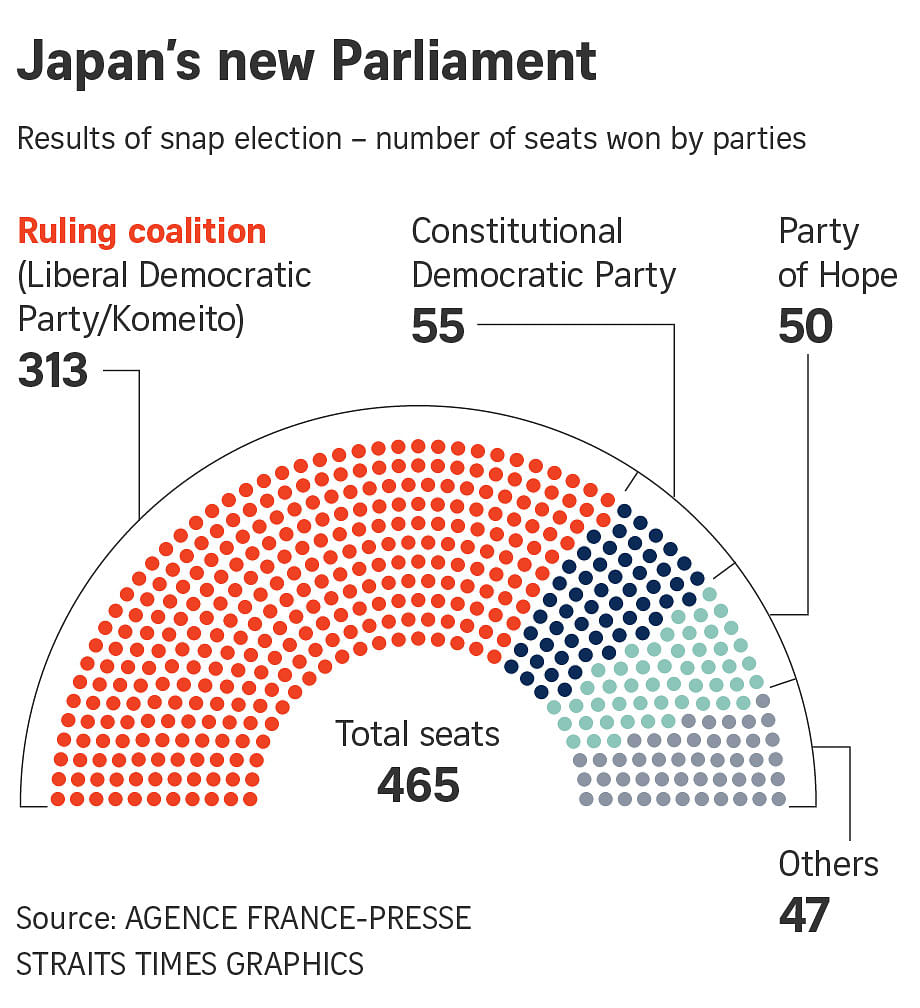Japanese Prime Minister Shinzo Abe, buoyed by a strong electoral mandate, said he will work with world leaders to contain the North Korean threat and also push forward social security measures.
He also vowed to forge a national consensus on the divisive issue of revising Japan's 70-year-old pacifist post-war Constitution.
At a news conference yesterday, Mr Abe reiterated the need to "work together with the international community to collectively strengthen pressure" on North Korea, while pledging to "humbly fulfil his promises one by one", including safeguarding social security, given the challenges posed by the nation's demographics.
The Nikkei 225 index rose 1.1 per cent to close at 21,696.65, in a record streak of 15 straight days of gains.
The ruling Liberal Democratic Party (LDP) won Sunday's general election on a platform of "protecting Japan". Despite heavy rain from Typhoon Lan, voter turnout - at 53.6 per cent - was up 0.9 point from the historic low in 2014.
The LDP and its coalition partner Komeito together won 313 of the 465 seats up for grabs, giving the bloc a two-thirds "supermajority" in the Lower House. They held 324 of 475 seats previously.
The left-leaning Constitutional Democratic Party emerged as the largest opposition party with 55 seats. The right-leaning Kibo no To (Party of Hope) won just 50.
Mr Abe is expected to announce his new Cabinet next week, but does not look likely to make major changes to the line-up he assembled only in August.
On North Korea, which has threatened to "sink" Japan and sent two missiles flying over Hokkaido in recent weeks, Mr Abe said he would reaffirm with United States President Donald Trump their countries' joint strategy of "strong diplomacy" against Pyongyang.
This will involve tightening the noose through economic sanctions to make it give up its ballistic missile and nuclear development programmes. Pyongyang yesterday accused "Japanese reactionaries" of using the election to "pave the groundwork for a reinvasion of the Korean peninsula", The Japan Times reported.
Mr Trump, due to visit Tokyo on Nov 5, called to congratulate Mr Abe on his win yesterday.
Mr Abe will attend the Asia-Pacific Economic Cooperation meeting from Nov 11 to 12 in Vietnam, where he said he looks forward to discussing North Korea with the Chinese and Russian presidents.
He repeatedly stressed that the LDP would "very humbly" regard its huge mandate, and that he will continue to answer questions over two cronyism scandals that sank public trust in him. Media exit polls on Sunday showed 51 per cent of voters do not trust the Premier.
Mr Abe said the biggest challenge to his trademark "Abenomics" economic policy is the demographic crisis - the double whammy of an ageing population and a shrinking workforce. He pledged to tackle this by proceeding with a twice-delayed sales tax rise from 8 per cent to 10 per cent in October 2019, with part of the additional revenue used for social security measures such as free early education.
He struck a careful tone over the divisive subject of revising the war-renouncing Constitution for the first time in 70 years. The controversy lies in a proposed new clause to the pacifist Article 9, to explicitly define the role of the military.
While Mr Abe has stressed that Japan will retain its exclusively pacifist stance, critics are concerned that any changes will mark the start of a slippery slope towards a remilitarised Japan, given the LDP's ultra-nationalist links.

Revising the Constitution will require the support of two-thirds of the lawmakers in both the Lower and Upper Houses of the Diet - which the LDP-Komeito coalition has. The proposal will then need to be put to a public referendum, where a majority vote is needed.
Despite an earlier target to revise the supreme law of the land by 2020, Mr Abe said this schedule was not cast in stone.
"It is necessary to strive to form a wide-ranging agreement among the ruling bloc (despite it having won a two-thirds majority) and the opposition," he said.
"And then we can aim to win the understanding of the people."
PM Lee offers 'heartiest congratulations'
Singapore Prime Minister Lee Hsien Loong has offered his "heartiest congratulations" to his Japanese counterpart Shinzo Abe, calling the snap general election victory "a vote of confidence in your strong leadership and vision for Japan".
In his letter to Mr Abe yesterday, Mr Lee underscored the long-standing bilateral relations between the two countries and their growing people-to-people ties.
"I had the pleasure of making an official visit to Japan last year, during which we took stock of our relations on the occasion of the 50th anniversary of the establishment of diplomatic ties," the Singapore leader wrote in his letter released by the Ministry of Foreign Affairs.
"Looking ahead, there is scope to further broaden and deepen bilateral cooperation in several areas, including smart-city initiatives."
Mr Lee added that Singapore welcomes Japan's enhanced engagement of Asean, and seeks Japan's continued support as Singapore assumes the Asean chairmanship next year.


